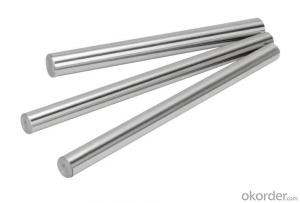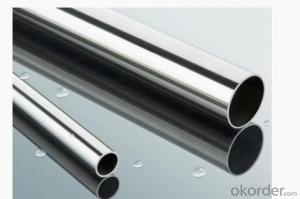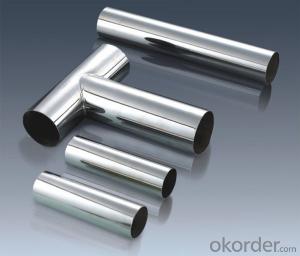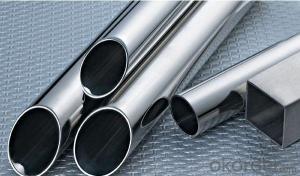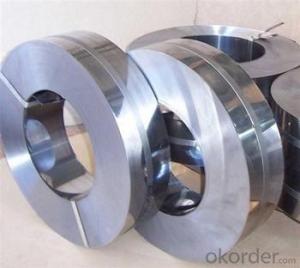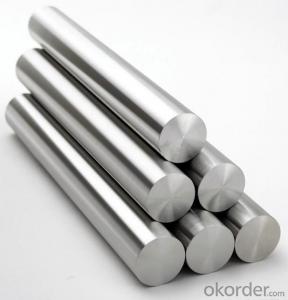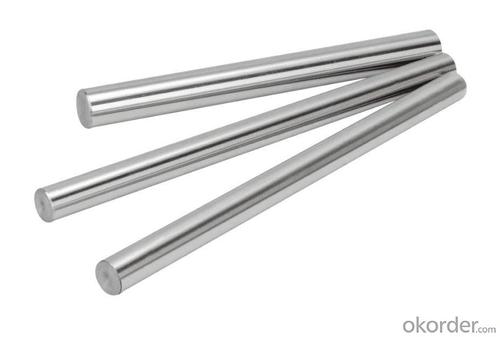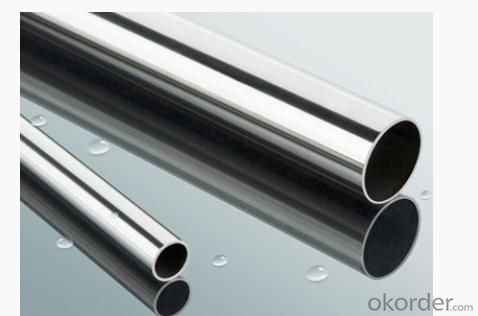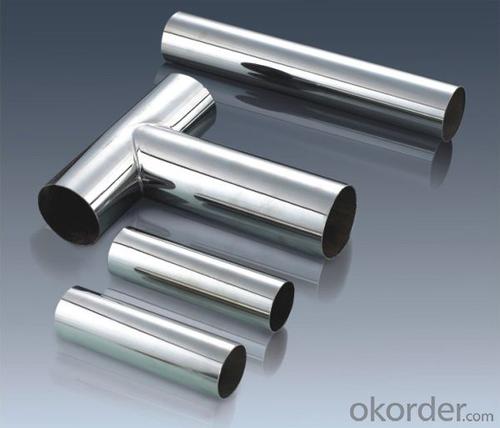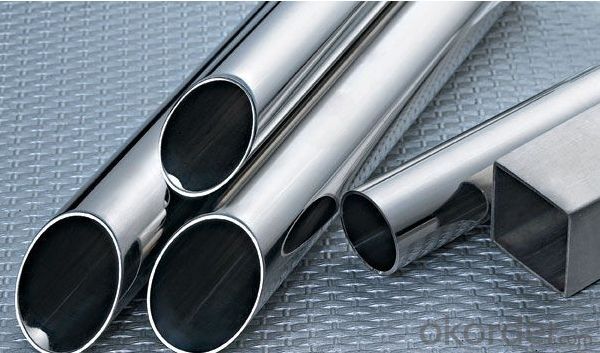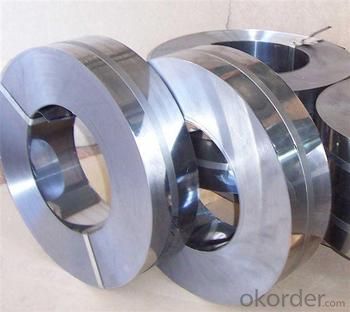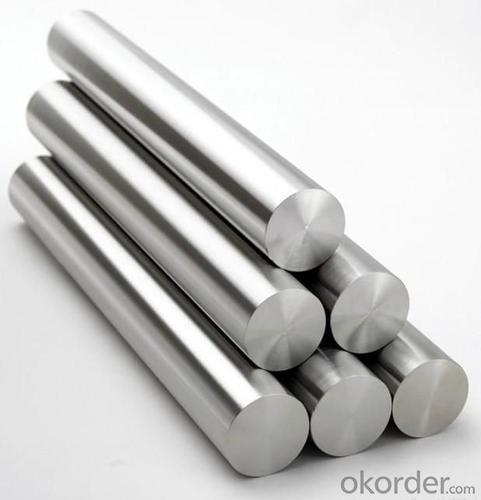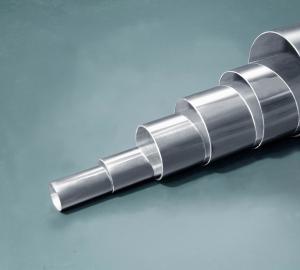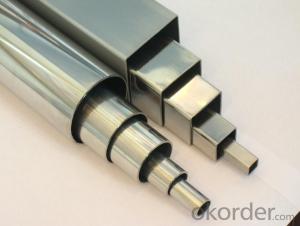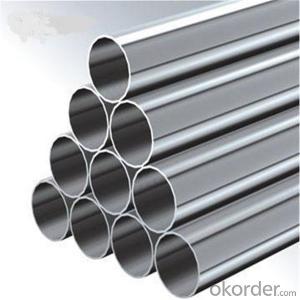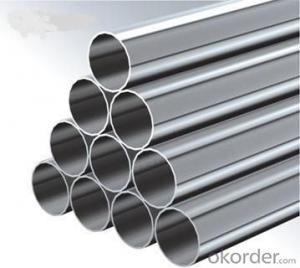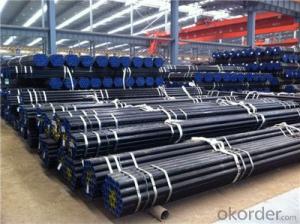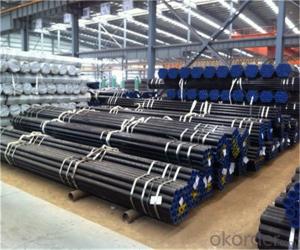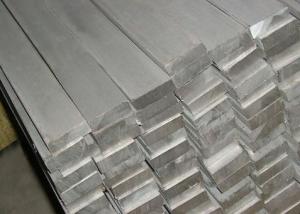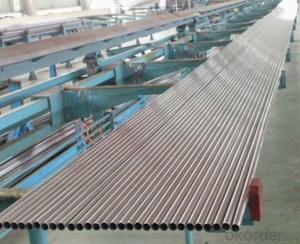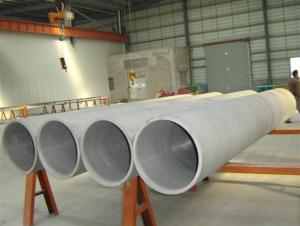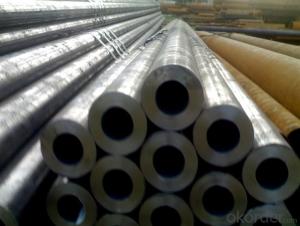Stainless Steel 304 tube with excellent quality
- Loading Port:
- Shanghai
- Payment Terms:
- TT OR LC
- Min Order Qty:
- 10000 m.t
- Supply Capability:
- 1000000 m.t/month
OKorder Service Pledge
OKorder Financial Service
You Might Also Like
Stainless steel 304
Product Information of stainless steel:
- Width: customized
- Surface: 2B/BA/6K/8K/NO.4/HL.
- Thickness: 0.3mm - 3.0mm.
- Delivery time: 15-25 days.
- Length : As customer's requirement.
- Package: With export standard packing or customize packing.
- Payment Terms: T/T (30% deposit pay in advance and the balance before shipment) , irrevocable L/C.
Company advantage:
-Top Equipments, Leading In The Industry.
- Professional Team, Leading Innovation.
- Huge Supply Capacity Advantage, Timely and Effective Delivery.
- Modern Logistic, Fact and Convenient.
- Precise Manufacturing, Exquisite Products.
- Serve People, Create Value.
- Dimensional Network, Powerful Expansion.

- Q: Can stainless steel pipes be electroplated?
- No, stainless steel pipes cannot be electroplated. Electroplating is a process by which a layer of metal is deposited onto a conductive surface using an electric current. However, stainless steel is already a corrosion-resistant material due to its composition of chromium, which forms a protective layer on its surface. Because of this, stainless steel pipes do not require electroplating as they already possess the desired properties of durability and resistance to corrosion.
- Q: Can stainless steel pipes be used for geothermal heating systems?
- Yes, stainless steel pipes can be used for geothermal heating systems. Stainless steel is a popular choice for geothermal applications due to its superior corrosion resistance properties. Geothermal heating systems involve the transfer of heat from the ground to the building, and stainless steel pipes are highly resistant to the corrosive effects of the soil and water found in geothermal environments. Additionally, stainless steel pipes can withstand high temperatures and pressure, making them suitable for the demanding conditions of geothermal systems. The durability and longevity of stainless steel pipes also make them a cost-effective choice for geothermal heating systems, as they require minimal maintenance and have a long lifespan.
- Q: Can stainless steel pipes be used for pharmaceutical processing equipment?
- Yes, stainless steel pipes can be used for pharmaceutical processing equipment. Stainless steel is a preferred material in the pharmaceutical industry due to its excellent corrosion resistance, durability, and ease of cleaning. It is resistant to chemicals, corrosion, and high temperatures, making it suitable for handling and transporting various pharmaceutical substances. Additionally, stainless steel pipes have a smooth surface that minimizes the risk of contamination and allows for easy cleaning and sterilization. Overall, stainless steel pipes are widely used in pharmaceutical processing equipment to ensure the integrity and quality of pharmaceutical products.
- Q: Stainless steel and stainless steel pipe inside and outside polishing off, what is the difference?
- Deoiling stainless steel tube pipe means no oil after surface cleaning, degreasing bath immersion of the surface to see see oil is not removed, belonging to clean level products, mainly used in pharmaceutical equipment, water equipment, semiconductor and LCD needed for the production of the gas pipeline.
- Q: Can stainless steel pipes be insulated with Teflon?
- Indeed, Teflon can be utilized to insulate stainless steel pipes. Teflon, or polytetrafluoroethylene (PTFE) as it is also referred to, is a highly adaptable substance that is frequently employed due to its nonstick properties and its ability to withstand high temperatures and chemicals. It is an exceptional option for insulating stainless steel pipes since it provides thermal insulation, guards against corrosion, and prevents heat loss or gain. Furthermore, Teflon insulation minimizes condensation or moisture accumulation on the pipe's surface. Moreover, Teflon's low friction coefficient enables smooth fluid flow through the pipes, rendering it appropriate for a wide range of applications in industries like food processing, pharmaceuticals, and chemicals.
- Q: Can stainless steel pipes be used in food processing industries?
- Yes, stainless steel pipes can be used in food processing industries. Stainless steel is a highly durable and corrosion-resistant material that does not react with food or beverages, making it ideal for use in food processing facilities. It is also easy to clean and maintain, ensuring the safety and hygiene of the food processing process.
- Q: Are stainless steel pipes suitable for pulp and paper industries?
- Yes, stainless steel pipes are highly suitable for pulp and paper industries. This is primarily because stainless steel offers excellent corrosion resistance, which is crucial in environments where pulp and paper production takes place. The chemicals and liquids used in the pulp and paper industry can be highly corrosive, and stainless steel is resistant to corrosion caused by these substances. Additionally, stainless steel pipes are known for their durability and strength, making them capable of withstanding the rigorous demands of the industry. They can handle high temperatures and pressures, ensuring reliable and efficient performance in the production process. Furthermore, stainless steel pipes are hygienic and easy to clean, which is essential in maintaining the quality and integrity of the products in the pulp and paper industry. Overall, the exceptional properties of stainless steel pipes make them an ideal choice for use in the pulp and paper industry.
- Q: Are stainless steel pipes suitable for beer brewing applications?
- Stainless steel pipes are a highly suitable option for beer brewing applications. They are widely favored in the brewing industry because of their exceptional resistance to corrosion, long-lasting durability, and hygienic properties. The smooth surfaces of these pipes prevent the accumulation of bacteria, yeast, and other impurities, thereby guaranteeing a brewing environment that is both clean and safe. Moreover, stainless steel pipes boast high resistance to elevated temperatures, making them indispensable for various brewing processes like boiling and sterilization. Furthermore, stainless steel is an inert material, signifying that it does not interact with the beer, thereby ensuring the preservation of the taste and quality of the final product. Ultimately, stainless steel pipes deliver the necessary attributes for beer brewing applications and are extensively utilized in the industry.
- Q: Are stainless steel pipes suitable for food processing industries?
- Yes, stainless steel pipes are highly suitable for food processing industries. Stainless steel is a preferred material in these industries due to its excellent corrosion resistance, durability, and hygiene properties. Stainless steel pipes do not react with food or alter its taste, and they are resistant to staining, rusting, and chemical damage. This makes them ideal for transporting various food products, including liquids, gases, and solids. Additionally, stainless steel pipes are easy to clean and maintain, reducing the risk of contamination and ensuring food safety.
- Q: How do stainless steel pipes compare to nickel alloy pipes?
- Both stainless steel pipes and nickel alloy pipes are widely utilized in various industries for their corrosion resistance properties, high strength, and durability. Nevertheless, there are noteworthy distinctions between these two materials that should be taken into account during comparisons. A primary difference lies in their composition. Stainless steel pipes consist mainly of iron and chromium, with additional elements like nickel and molybdenum added to enhance corrosion resistance. On the other hand, nickel alloy pipes are primarily composed of nickel, with the inclusion of other elements such as chromium, iron, and molybdenum. Regarding corrosion resistance, both stainless steel and nickel alloy pipes offer exceptional protection against corrosion. However, nickel alloy pipes are recognized for providing superior resistance to a broader range of corrosive environments, including highly acidic and alkaline conditions. This makes nickel alloy pipes more suitable for applications requiring extreme corrosion resistance, such as in chemical processing plants. Another factor to consider is the mechanical strength of the pipes. Stainless steel pipes are known for their high strength, making them suitable for applications requiring structural integrity and the ability to withstand high-pressure environments. Conversely, nickel alloy pipes offer even greater strength and toughness, making them ideal for applications involving high temperatures and extreme conditions, such as in the oil and gas industry. Cost is another aspect to consider when comparing stainless steel and nickel alloy pipes. Stainless steel pipes are generally more cost-effective and readily available compared to nickel alloy pipes. Nickel alloy pipes tend to be more expensive due to the higher cost of nickel and other alloying elements used in their production. Therefore, the choice between stainless steel and nickel alloy pipes often depends on the specific requirements of the application and budget constraints. In conclusion, both stainless steel pipes and nickel alloy pipes offer excellent corrosion resistance and mechanical strength. While stainless steel pipes are more cost-effective and commonly used in various applications, nickel alloy pipes provide superior corrosion resistance and strength in extreme conditions. Therefore, the selection between these two materials depends on the specific needs and requirements of the application at hand.
Send your message to us
Stainless Steel 304 tube with excellent quality
- Loading Port:
- Shanghai
- Payment Terms:
- TT OR LC
- Min Order Qty:
- 10000 m.t
- Supply Capability:
- 1000000 m.t/month
OKorder Service Pledge
OKorder Financial Service
Similar products
Hot products
Hot Searches
Related keywords
